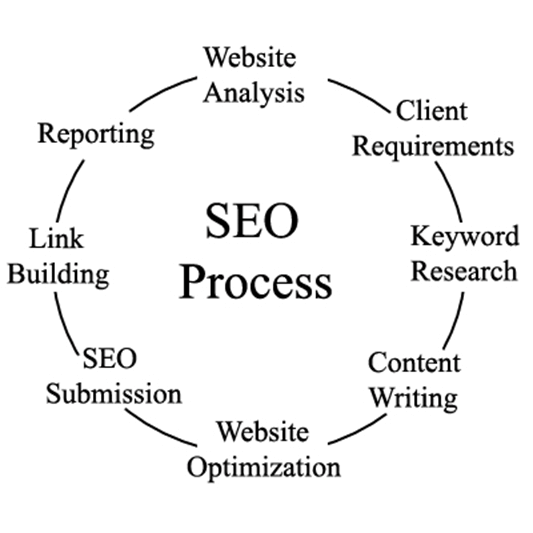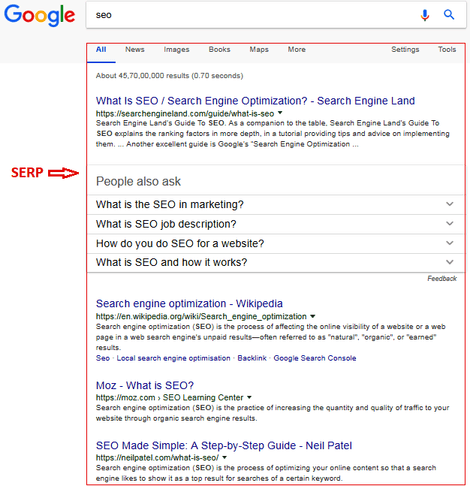Interview :: SEO
SEO stands for Search Engine Optimization. It is a process of increasing the number of visitors to a website. It enhances the visibility of a web page and increases the quantity and quality of traffic to a website so that it could appear at the top of search engine result pages.
It optimizes the websites for search engines and thus helps it achieve higher ranking in search engine result pages when users use keywords related to their products or services. Therefore, it improves the quality as well as the quantity of traffic to a website through organic search engine results. Some of the basic activities involved in an SEO process are as follows:

They are called SEO executives, Webmasters, Websites optimizers, Digital marketing experts, etc.
SEO executive: He is responsible for increasing the number of visitors or traffic to a website using various SEO tools and strategies.
SEO/SMO analyst: He is responsible for planning and implementing SEO and social media strategies for the clients. He is supposed to quickly understand and support initiatives to achieve the objectives and goals of the client campaigns.
Webmaster: He is responsible for maintaining one or more websites. He ensures that the web servers, software, and hardware are working smoothly.
Digital Marketing Expert: He is responsible for planning and executing digital marketing programs to promote the brand or increase the sales of the products and services of the clients.
Google webmaster tools, Google Analytics, Open site explorer, Alexa, Website grader are some of the free and basic tools which are commonly used for SEO. However, there are also many paid tools like Seo Moz, spydermate, bulkdachecker, readily available in the market.
Google webmaster tools: It is one of the most useful SEO tools. It is designed for the webmasters. It helps webmasters communicate with Google and evaluate and maintain their website's performance in search engine results. Using webmaster, one can identify the issues related to a website such as crawling errors, malware issues, etc. It is a free service offered by Google, anyone who has a site can use it.
Google analytics: It is a free Web analytics service offered by Google. It is designed to provide analytical and statistical tools for SEO and digital marketing. It enables you to analyze website traffic and other activities that take place on your website. Anyone who has a Google account can use this service.
Open site explorer: It is a Mozscape index-powered workhorse which is designed to research backlinks, find link-building opportunities and find out links that may impact rank badly.
Alexa: It is a global ranking system that compiles a list of most popular websites based on the web traffic data and accordingly provides Alexa Rank to a website. The lower the Alexa rank, the more popular a website, e.g., a site with rank 150 will have more visitors than a site with rank 160.
Website grader: It is a free online tool designed to grade a website against some critical metrics like performance, SEO, security and mobile readiness.
Some Paid SEO Tools:
SEOMoz: It is a premium SEO web application designed for SEO. It provides analytics and insights to improve your search engine rankings. It is a collection of various SEO tools that cover all vital areas of SEO.
Spyder Mate: This software allows you to improve the ranking of your website as well as offers various methods to promote a website. It enables you to manage your web portal to attract more and more traffic to your site.
Bulkdachecker: It is used to check the Domain Authority of Multiple Websites simultaneously.
On page SEO: It means to optimize your website and make some changes in the title, meta tags, structure, robots.txt, etc. It involves optimizing individual web pages and thus improves the ranking and attracts more relevant traffic to your site. It this type of SEO, one can optimize both the content and the HTML source code of a page.
Main aspects of On page SEO are:
- Page Title: It should be relevant, unique and should include your main keywords.
- Meta Descriptions: There should be a Meta description for each webpage, and it must contain relevant keywords for your content.
- Meta Tags: You can add a set of keywords as Meta tags for each of your page.
- URL Structure: You can include search engine friendly URLs for your webpage as it improves crawling. In SEO, shorter URLs containing targeted keywords usually perform better.
- Body Tags (H1, H2, H3, H4, etc.): You can use body tags to break up your content into paragraphs to make it easier to read.
- Keyword Density: You should include relevant keywords in your content but avoid excessively repeating or overusing keywords.
- Image: You can use relevant images within your content to make your page visually more appealing and thus can improve the SEO of your site.
- Internal Linking: You can place links to your other web pages to enhance your website. It enhances navigation and crawling.
Off page SEO: It means optimizing your websites through backlinks, social media promotion, blog submission, press releases submission, etc.
Main aspects of Off page SEO are:
- Social Networking Sites: There are many social networking sites such as Facebook, LinkedIn, Twitter, etc., where you can create your business page and perform similar tasks to improve the SEO of your site.
- Blogging: You can write a blog for your website, product or service and submit it to niche blog directories, and blog search engines.
- Forum Marketing: You can find online forums related to your site and interact with them by replying to threads, answering questions, offering advice and more.
- Social Bookmarking: You can submit your blog posts and pages to the relevant and popular bookmarking sites like Digg, Delicious, Reddit, etc.
- Link building: You can build external links to your site to bypass your competitors and improve your rank.
- Press Release Submission: You can distribute your press release across various media to get authority backlinks and convey information to the public. It can bring your site on the first page for your keywords.
In On Page SEO, optimization is done on the website that involves making changes in the title tag, meta tags, site structure, site content, solving canonicalization problem, managing robots.txt, etc. Whereas, in off page SEO, the primary focus is on building backlinks and social media promotion.
On page SEO techniques:
It mainly involves optimizing the page elements such as:
- Page Title
- Page description
- Canonical URL
- Open Graph Tags
- Page Headers and Sub-Headers
- Paragraph Text
- Alt Image Tags
- Internal and External Links
Off page SEO techniques:
It mainly focuses on the following methods:
- Link Building
- Blogging
- Social Media
- Press Release Submission
There are several Off page SEO techniques such as:
- Directory Submission: You can submit your site to a particular category of a web directory, e.g., if you are offering online tutorials, you should submit your site to the education category of a web directory. It will help you build more backlinks.
- Social Bookmarking: It enables you to store your links on bookmarking sites. These links serve as backlinks and thus helps improve the SEO of your website.
- RSS (Really Simple Syndication) Submission: It allows you to submit RSS feeds to RSS submission directory sites to improve SEO of your site.
- Article Posting: It enables you to submit articles to popular article submission directories. It gives you backlinks and improves the page-rank of your website or blog. You are required to submit articles in relevant categories for better results.
- Blog Posting: It allows you to post blogs and thus you can offer fresh content to your users on a regular basis. Blogs help convert prospects into actual customers.
- Press Release Submission: You can write a press release about new events, products, and services of your company and submit it to PR sites.
- Forum Posting: It enables you to build quality inbound links by participating in online discussion forums.
It is an American multinational company which specializes in Internet-based products and services. Its services include a search engine, online advertising, cloud computing, software and more.
It is co-founded in 1998 by Larry Page, an American computer scientist and internet entrepreneur, and Sergey Brin who is also an American computer scientist and internet entrepreneur.
A search engine is a web-based software program that is developed to search and find information on the World Wide Web. It enables internet users to search the information via the World Wide Web (WWW). The user is required to enter keywords or phrases into the search engines and then search engine searches websites, web pages or documents containing the similar keywords and presents a list of web pages with same keywords in the search engine result pages.
We can say that it generally answers the queries entered by the users in the form of a list of search results. So, it is a web-based tool that enables us to find information on the World Wide Web. Some of the popular search engines are Google, Bing, and Yahoo.
A search engine result page is the list of results for a user's search query and is displayed by the search engine. It is displayed in a browser window when the users enter their search queries in the search field on a search engine page.

The list of results generally contains a list of links to web pages that are ranked from the most popular to the least popular. Furthermore, the links also contain the title and a short description of their web pages. Furthermore, SERP not only provides the list of search results, but it may also include advertisements.
